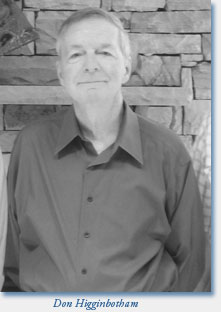 Don Higginbotham, Dowd Distinguished Professor at the University of North Carolina at Chapel Hill, died on June 22, 2008, of cancer at the age of 77. A native of Missouri and educated at Washington University in St. Louis (BA and MA) and Duke University (PhD), he taught briefly at Duke, the College of William and Mary, and Longwood College before joining the Louisiana State University’s history faculty in 1960 and then the University of North Carolina’s in 1967.
Don Higginbotham, Dowd Distinguished Professor at the University of North Carolina at Chapel Hill, died on June 22, 2008, of cancer at the age of 77. A native of Missouri and educated at Washington University in St. Louis (BA and MA) and Duke University (PhD), he taught briefly at Duke, the College of William and Mary, and Longwood College before joining the Louisiana State University’s history faculty in 1960 and then the University of North Carolina’s in 1967.
Higginbotham specialized in 18th-century America. He published his dissertation on Revolutionary War General Daniel Morgan in 1961. Then withThe War of American Independence: Military Attitudes, Policy, and Practice, 1763–1789 (Macmillan, 1971), he emerged with a national and then international reputation not only as an early American historian, but as a pioneer of the “new military history,” investigating reciprocal ways in which war, politics, the military, and society interacted to explain events and shape behavior. That seminal volume, nominated for the Pulitzer Prize and still the standard work on the subject, was followed by studies of the maps of the American Revolution and the edited papers of the North Carolina judge and political leader James Iredell. In the latter half of his productive career he concentrated on the life and contributions of George Washington. While publishing three much-lauded books and many essays on the subject, he also contributed notable essays on comparative history, the Second Amendment, military institutions, and the historiography of early American military history. In edited works of his own and others’ essays, he continued to advance our understanding of the revolution and military conflict which began the United States.
Higginbotham won many prizes for his work. Perhaps he favored most the recognition in 1998 by Mount Vernon and the Organization of American Historians of his George Washington and the American Military Tradition as one of the 10 best books ever written about Washington. It ranked number five, “ahead of UNC’s basketball team’s CNN and AP rankings,” he wrote on his departmental resumé.
That comment captured his modesty, wit, charm, light touch, and love of sport. A fine athlete (and devoted fan of the St. Louis Cardinals) who played a skillful game of basketball well into his 60s, Higginbotham was a gracious, principled, and loyal friend and colleague whose scholarship, candor, and fairness inspired confidence and admiration. He went out of his way to introduce new members of the history department to colleagues and to help younger scholars with their work and professional concerns. He was a demanding, rigorous, and beloved teacher of both undergraduates and graduate students, offering courses on the Revolution and early national period, as well as the American history survey. He pursued special interests in undergraduate research seminars, including the history of sport and comparing the American Revolutionary and Civil Wars. Throughout his four decades at Carolina, he provided a steadying and thoughtful presence. He went out of his way to understand other points of view, and to be cooperative and supportive of historians in his own department and those across the country. He was a model citizen who served on and chaired a wide variety of advisory, prize, search, policy, and organizing committees. He chaired both the history department (1978–83) and the Curriculum in Peace, War, and Defense (1988–92). He was a mentor and role model to many friends and colleagues who will miss his quiet gentility and devotion to the best standards of our craft and calling.
Don Higginbotham also gave generously of his time and wise judgment to a wide range of advisory boards for documentary editing projects; program, prize, and nominating committees; historical journals; and governing councils of the leading learned societies and historical organizations in the profession. In recognition of his contributions and accomplishments, he served as president of the Southern Historical Association (1990–91) and the Society for Historians of the Early American Republic (1992–93). Long interested in the wider dimensions of the military in American society both historically and in the present, he twice (1975–76 and 1998–99) taught as visiting professor in the West Point history department, lectured often in the military history summer seminar there, and maintained a close relationship with many of the permanent and rotating professors on the faculty.
Don Higginbotham leaves his loving wife Kathy; her two daughters, Hilary Philipps and Christina Rich; sons Robert, Larry, and David by his first wife Mary, whose loss some four decades ago had left him a young widower; and eight grandchildren.
One of Don’s PhDs quoted Jefferson’s comment about George Washington—“a wise, a good, and a great man”—to describe Don because it so perfectly fit this kind, friendly gentleman. Don will be long remembered by the thousands of students he taught and the many friends and colleagues whose lives he enriched. We are all grateful for him.
Richard H. Kohn
University of North Carolina at Chapel Hill